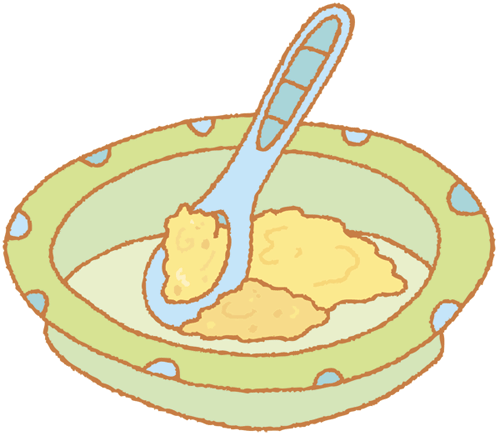|
The first months of your baby’s life may fly by, and as the gaps between feeds lengthen, and he becomes more alert and expends more energy, you may find that he is showing signs of being ready for solid food. Let your baby take the lead.

| Q: |
My four-month-old seems hungry all the time—could she be ready to begin solids?
| | A: |
Currently the most common recommendation for weaning age comes
from the World Health Organization (WHO), which suggests waiting until
six months of age to introduce solids. We know, however, that babies’
digestive and immune systems can tolerate food a little earlier (from
around 17 weeks of age), and so the exact timing is really dependent on
your baby; every baby is different. If your baby is demanding feeds more
often, shows an interest in the food you are eating (for example
reaching out for food on your plate), and is “mouthing” (chewing on her
knuckles or putting her fingers in her mouth), it is likely that she’s
ready. Speak to your pediatrician if you think this is the case.
Suitable early weaning foods include vegetables, fruit, and cereals .
|
| Q: |
Why do experts now recommend waiting until six months to wean?
| | A: |
All countries, and health experts, have adopted the guidelines
from the WHO, which recommends exclusive breastfeeding until six months.
This is particularly important in underdeveloped countries, where
breast milk is sterile and the safest feeding option, and is also a good
safeguard for children who may have a poor weaning diet.
The main reason to
wait until six months is that until this time your breast milk will
provide your baby with everything he needs to grow and develop; however,
after this, breast milk alone provides insufficient essential
nutrients, like iron and vitamin D. That’s not to say that breast milk
has no nutritional value after this time ,
but your baby’s growth and development demands more nutrients that need
to be provided through weaning foods. Similarly, formula-fed infants
also need to be weaned at six months to supplement nutritional intake.
If your baby does show signs that he is ready for solid food a little
earlier (see My four-month-old seems hungry all the time—could she be ready to begin solids?),
it’s a good idea to speak to your doctor about the possibility of
introducing some simple foods, as these will ensure normal oral motor
skill development in your baby (i.e., sucking and chewing).
|
| Q: |
Will early weaning make my baby more prone to allergies?
| | A: |
Another argument that is sometimes put forward against weaning
babies earlier than six months is based on the notion that early weaning
makes babies more prone to allergies. However, this is not true. Most
babies’ digestive systems can tolerate basic food from around 17 weeks,
and there is no evidence that delaying weaning beyond this time prevents
allergies in either allergic or non-allergic infants.
|
| Q: |
Does my baby need juice or water alongside her milk feeds?
| | A: |
Breastfed babies do not need water or juice, as your milk is
perfectly balanced, both to quench thirst and to keep her well hydrated.
If she has a virus and is struggling to keep down her milk, you may
need to offer water or oral rehydration solution to ensure that she does
not become dehydrated,
although the best advice is to continue breastfeeding, both to ensure
she gets enough fluids, and to take advantage of the antibodies that
your breast milk offers. Bottle-fed babies may need to have a little
water alongside their feeds .
Baby juices are not
necessary at this age, as your baby will be getting all the nutrients
she needs from her milk. If she’s thirsty and not interested in water,
you could heavily dilute a little baby juice, but doing this may have
frustrating after-effects; if she’s used to the sweetness of juice, she
may be less likely to take plain water later on. If she is ill and there
is risk of dehydration, however, any fluids, such as heavily diluted
juice, water, and oral rehydration solution are appropriate.
|
| Q: |
My baby keeps reaching out for other people’s food. Should I let him taste?
| | A: |
Once again, from around five months onward, small tastes of food
are acceptable. Be aware, however, that your baby won’t have developed
the ability to chew, and won’t for some time, so anything offered should
be soft and, ideally, puréed. Remember to keep to foods that are
suitable for your baby’s age .
Steer away from foods that contain flavorings, colorings, and
sweeteners, and avoid anything with sugar and salt, as you’ll want to
encourage your little one to develop a taste for the natural sweetness
of foods such as fruits and vegetables, before a sweet tooth can be
established.
|
Mastering a cup
Most babies drink from a
cup at around four months, although you will have to hold it to his
mouth and encourage him to sip. He should be able to do this himself at
around six months, although some little ones may manage it sooner, and
others a little later. Don’t worry if your baby shows no interest. He
should be getting adequate fluids from his milk feeds (and solids—if
he’s begun weaning). It may be easier to offer all drinks, apart from
milk in a cup, to prevent him from developing the habit of taking
everything from a bottle.
|